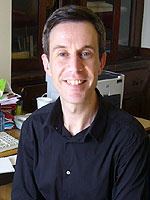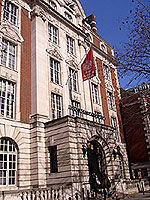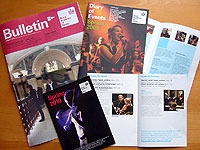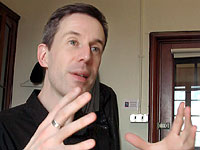English

'Music in Community' programme is part of the curriculum of the Royal Academy of Music (RAM), which has a history of 188 years in the UK. What is the reason for the conservatoire, which is famous for its rich alumni of world-class musicians, including a community music programme as compulsory for all of its students? I had a chance to interview Julian West, Head of Open Academy, who is in charge of the programme.
Host: Open Academy, Royal Academy of Music (RAM)
Venue: Marylebone Road, London NW1 5HT, UK (Map)
Interview: Julian West, Head of Open Academy

The RAM was founded in London in 1822, and has been training lots of distinguished music figures, such as Sir Simon Rattle and Sir Elton John. Situated in the south of the Regents Park in central London, its first-class teachers, interaction with top artists and arts organizations, in-school halls for concerts and theatres, more than a hundred practice rooms, and quality equipment for recording have all attracted more than 700 students from over 50 countries, to study on undergraduate or postgraduate courses in one of the 17 departments, including musical instruments, voice, composition, and jazz. In 2009, the British newspaper, the Guardian, rated the RAM the best specialist institution in the UK and evaluated it as best place to study music in Britain.
As well as its proud tradition of 'training musicians to the highest professional standards', the RAM also identifies its mission as being 'to prepare students for a successful career in music according to the evolving demands of the profession', and, in fact, over 90% of recent graduates are actively working in the music profession. Recently, being 'aware that performers now make their living in a wider pool of opportunity than ever before', the RAM established its Open Academy department, that seeks to 'challenge precautions of what music conservatoires do', and started 'Music in Community' course in 2004. The following is the interview with Julian West, Head of Open Academy, who is in charge of the programme.

I have served as the Head of Open Academy at the RAM for two years. I purely teach the 'Music in Community' class, and I am not teaching any instruments here. The Head of Open Academy also works as a consultant for other departments to give advice and arrange things from the point of view of how that department can expand its activities outside the Academy. Events open to the public are organized by the Events Department, and we also devise collaborative events sometimes.
When I was working as a freelance oboist, a friend of mine asked me to play in a youth project for which he was working as a musical director at Glyndebourne Opera. Glyndebourne Opera was founded in 1986, and was the first organization to include a community education department of all the arts organizations in the UK. I really enjoyed the environment. Then, they asked me if I would become a musical director for the youth group of the primary schoolchildren, which they just had started in addition to the existing one for the secondary schoolchildren. I said, 'Yes, I'd love to'. That was the start of it.

Yes. It was about 15 years ago when there were rarely any training courses available in this field. The Guildhall School of Music and Drama had started a new course, but there was still nothing like a career path to get into this field of work. So, I learnt knowledge and skills from the Glyndebourne Opera through work experience. Although it was all new to me, since it was based on opera work, I could work as part of the team of three: dramatic movement, music, and designer, and learnt a lot from working together.
Yes. I have been working freelance with various arts organizations, and I now still work half the time at the Academy, and half outside the Academy. I am mainly interested in the following three fields of work: early years' work, such as Chamber Tots in the Community at Wigmore Hall; Music for Life, for people with dementia; and Special needs education, for adults and children with learning disability.
The Academy is a fantastic place in terms of the rich resources and knowledge, incredible experts and musicians. Now, it is very keen to see how we can spread these incredible resources beyond the walls of this building, and it is not against our value of high standard training but, rather, we believe that it is done through the training of our students. So it introduced 'Music in Community' programme in its curriculum, and created the system of our students going out of the Academy to work with the community through engaging in creative projects. I feel that our role is about broadening the access of people who do not have opportunity to experience live music of the very high level, drawing out their interest in music, and leading them to enjoy music somehow as part of their lives.

Exactly. Our first aim is that our students can see that there is a role for us as musicians outside traditional concert halls. It is also important that they discover/ rediscover the reason why they wanted to play music in the first place. Training to get a place here is highly competitive, and it only gets more intense after entering the Academy. It is easy to lose sight of why they wanted to learn music in the first place. By going outside of this building and working with children and other people in the community through music, they can feel the incredible impact that music and musicianship can have on people. Seeing the reaction of the children, they can see the reaction that they themselves used to have, and remember that 'That is why I decided to learn music!' It can re-connect them with themselves as musicians, and help to develop their identity as musicians.
Thus, the Academy has both roles: enriching the awareness and experience of our students; and spreading our fantastic resources in order for the outside community to be able to experience music at a very high level.
(Next, the interview moves on to what they actually do in the curriculum.)
Report: Chigusa Futako
| No.2 >>








